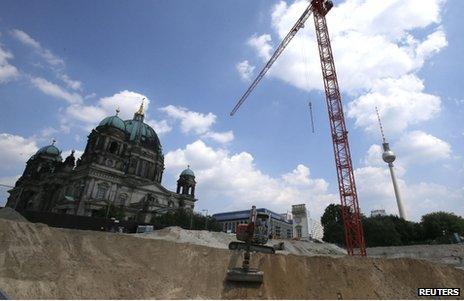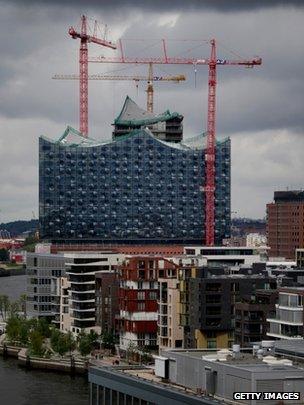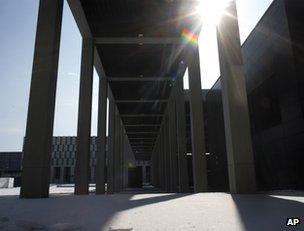Germany's troublesome prestige projects
- Published

Construction is under way at the site of the palace in Berlin
Amid much grandeur, President Joachim Gauck of Germany has just laid the foundation stone of one of the country's most ambitious post-war projects.
It is to build a replica of the magnificent palace used from 1702 by the kings of Prussia. Where there is now wasteland in the heart of Berlin, the plan is to recreate the courtyards and ornate domes which were once fit for Frederick the Great.
Or at least, to create the appearance of them. The plan is to build the facade of the old palace on three sides, with a modern interior and a modern fourth side facing the River Spree.
The way a country sees its buildings reflects the way it might like to see itself.
Berlin's Nazi past has nearly vanished. The pockmarks from bomb shrapnel all over the city have been filled in. The important buildings of the Hitler regime are car parks or they are used to house exhibitions illustrating the misdeeds.
But there is a yearning for the grandeur of the 19th Century. As onlookers at the ceremony to lay the foundation stone put it: "It's important for German history to build us this kind of castle.
"It's good for the history of Germany to make other people see how it has been here in the past."
'Historic loss'
The mayor of Berlin, Klaus Wowereit, told the BBC: "We are rebuilding something that got lost in the troubled history of this city, a city that had to go through two world wars and the communist dictatorship."
The original palace survived the bombing of the war - just. It remained standing but damaged. What finally destroyed it was the communist regime of the German Democratic Republic.
It decided that a royal palace did not quite fit the zeitgeist, applied dynamite and turned it to rubble, using the flattened site to build its parliament.
When communism fell, the new authorities decided that the parliament was a pretty ugly and worthless landmark and demolished that too - leaving a gaping space and so room for the recreation of the royal palace at an estimated cost of about 600m euros (£509m; $800m).
And that is one reason for the controversy surrounding the scheme.
Germany now has a string of big construction projects which are massively over-budget and behind time.
Runaway costs

The budget for the Elbphilharmonie site has more than doubled
Berliners swing between mirth and anger when they discuss the city's new airport. It was supposed to open two years ago but delay after delay means it will not now open until 2014 at the earliest.
The cost has soared as steeply as the planes that do not take off from its runways. Currently, the estimate is double the initial budget.
On top of that, there are elements of farce such as the trains which have to run to it every day - empty - to keep the lines in good shape (and the money meter clicking away furiously). Then there are the lights in the terminal that cannot be regulated so they shine through the night.
Or there is the Elbphilharmonie on the waterfront in Hamburg. This concert hall and five-star hotel in shimmering glass on top of an old warehouse was meant to cost 180m euros and meant to open in 2010. The current estimate is nearly 450m euros with an opening time of 2017.
It is generating much despair in the city. Marcel Schweitzer of the Association of Taxpayers in Hamburg told the BBC: "In the beginning we were very excited by this idea but the costs have increased so much that we are now depressed. The people say it's just ridiculous."
But Germany is meant to get these things right. It is the country, above all others, associated with efficiency and value for money. "Germany" and "austerity" are meant to go together.
So what has gone wrong? There are lots of theories. The most popular one is that politicians have grand ambitions but to get them approved, both by the democratically elected government and by the people themselves, the final bill has to be under-estimated. Snags get minimised. Little account of future problems is made.
Dr Dieter Faulenbach da Costa, an architect and city planner, told the BBC that political pressure to get big projects off the ground meant that the planning process was being done far too quickly. The result was that approval was being given for outlines of projects rather than for the detailed schemes as they might actually turn out.
That, he said, is what has happened with the new Berlin airport: "We have a nice design but the functionality of the building is not good.
"They need 115 stands for aircraft but they only have 85. They need 220 check-in counters but they've got far fewer. This means the capacity of the new airport is too small to handle the actual passenger and aircraft flow".

The empty main terminal of the new Berlin airport is seen here in March
'Money pit'
It may, of course, be a problem to do with many democratic societies. A study called "Survival of the Un-fittest" by Bent Flyvbjerg of the Said Business School at Oxford University talked about "perverse incentives that encourage promoters to underestimate costs and overestimate benefits in the business cases for their projects".
He said "the projects that are made to look best on paper are the projects that amass the highest cost overruns and benefit shortfalls".
As German commentator Georg Diez put it in plainer English in a Spiegel article, external: "First, someone comes up with something; then everyone does something completely different; and finally the whole thing goes haywire."
But if it is a problem for many democratic societies, why is it that Germany has so many big projects which are over-budget and behind time?
The reason may be that there are just more of them in Germany at the moment.
It is a country which is rebuilding and recreating itself. It has a new identity after communism, division and also the war. And a new identity means new ambitious structures. The country is becoming more confident - and richer. The demand for big, prestige buildings is rising and so is the supply of available money to fund them.
But not an unlimited supply of money. Some of these projects were started at a time of pre-crash boundless optimism but now struggle in the Age of Austerity.
So will the palace work out on budget and on time, then? The mayor of Berlin responded without complete certainty: "Well, you never know in the beginning do you? We'll pay the bill when we're finished. But let's say the prospects are good."
Berliners are not confident. One paper called the construction site where the palace will - if everything goes to plan - rise from the rubble "Berlin's newest big money pit".
- Published12 June 2013
- Published27 March 2013